قائمة المساجد في باكستان
كونها دولة إسلامية، فإن باكستان موطن لآلاف المساجد. وتحظى بعض المساجد بشهرة كبيرة بسبب حجمها وجمالها وهندستها المعمارية وتاريخها.[1] فيما يلي قائمة المساجد في باكستان.
| Name | Images | City | Capacity of worshipers | Area(m²) | Built | Remarks | References |
|---|---|---|---|---|---|---|---|
| Jamia Masjid Banbhore | 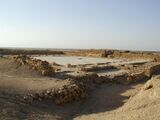
|
Banbhore, Sindh | 727 AD | Banbhore is an ancient city dating to the 1st century BC located in Sindh, Pakistan. The eastern part of the city contains ruins of Banbhore Mosque with an inscription dating to 727 AD, sixteen years after the conquest of Sindh, indicating the best-preserved example of the earliest mosques in the region. Ruins are still preserved in the city.This is considered one of the most oldest mosque in Pakistan. | [2][3][4] | ||
| Chaqchan Mosque | 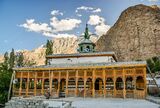
|
Khaplu, Gilgit Baltistan | 500 | 1370 | The Kashmiri-style Chaqchan Mosque was built in 1370, shortly after the area’s conversion to Islam. | [5][6][7] | |
| Amburiq Mosque | 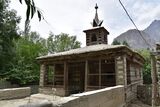
|
Shigar, Gilgit Baltistan | 500 | 63 m2 (680 sq ft) | 14th Century | It is one of the oldest mosque in Baltistan and was built by Sayed Ali Hamdani. It is also one of the most famous landmarks and a major tourist attraction in Baltistan. | [8][9] |
| Neevin Mosque | 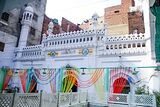
|
Lahore, Punjab | 100 | 1460 | Located in Walled City of Lahore, Neevin Mosque was built by Lodi dynasty under the rule of its first king Bahlul Lodi. | [10][11] | |
| Begum Shahi Mosque | 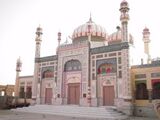
|
Lahore, Punjab | 1,600 m2 (17,000 sq ft) | 1614 | Begum Shahi Mosque is an early 17th-century mosque situated in the Walled City of Lahore. The mosque was built between 1611 and 1614 during the reign of Mughal Emperor Jahangir in honor of his mother. | .[12][13][14][15] | |
| Dai Anga Mosque | 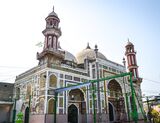
|
Lahore, Punjab | 1635 or 1639 | Situated at the southeast of Lahore Railway Station, in the city of Lahore. The mosque is said to have been built in 1635 in honour of the wetnurse of the Mughal Emperor Shah Jahan, Dai Anga. | [16][17] | ||
| Moti Masjid | 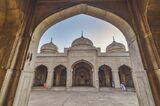
|
Lahore, Punjab | 160 m2 (1,700 sq ft) | 1635 | Moti Masjid is a 17th-century religious building located inside the Lahore Fort. It is a small, white marble structure built by Mughal emperor Jahangir, and is among his prominent extensions to the Lahore Fort Complex. | [18][19] | |
| Wazir Khan Mosque | 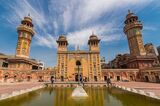
|
Lahore, Punjab | 10٬000 | 3,825 m2 (41,170 sq ft) | 1642 | The mosque was commissioned during the reign of the Mughal Emperor Shah Jahan. Construction of Wazir Khan Mosque began in 1634 C.E. and was completed in 1641. | [20][21] |
| Shahi Mosque, Chiniot | 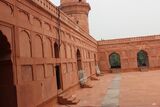
|
Chiniot, Punjab | 1٬200 | 1646-1655 | Built by Hakim Saad-Ullah Khan | ||
| Oonchi Mosque | 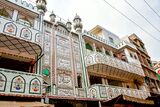
|
Lahore, Punjab | N.A. | Mughal Era mosque located along the Hakiman Bazaar, near the Bhati Gate which leads into the Walled City of Lahore. Unlike other mosques in the Walled City of Lahore, no inscription exists which signifies the year of the mosque's construction. | [22] | ||
| Shah Jahan Mosque | 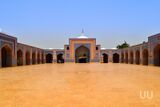
|
Thatta, Sindh | 20٬000 | 3,050 m2 (32,800 sq ft) | 1647 | Shah Jahan Mosque is a 17th-century building that serves as the central mosque for the city of Thatta, Sindh. It was built during the reign of Mughal emperor Shah Jahan. | [23][13][24][25] |
| Mohabbat Khan Mosque | 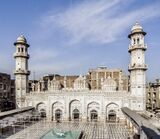
|
Peshawar, Khyber Pakhtunkhwa | 14٬000 | 2,800 m2 (30,000 sq ft) | 1670s | Mohabbat Khan Mosque is a 17th-century Mughal-era mosque in Peshawar, Pakistan. The mosque was built between 1660 and 1670, and named after the Mughal governor of Peshawar, Nawab Mahabat Khan bin Ali Mardan Khan. | [26][27][28] |
| Badshahi Mosque | 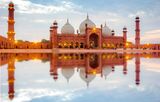
|
Lahore, Punjab | 100,000 | 25,642 m2 (276,010 sq ft) | 1673 | Second largest mosque in Pakistan and the fifth in the world; it was the largest mosque in the world from 1673 to 1986. The mosque is located west of Lahore Fort along the outskirts of the Walled City of Lahore, and is widely considered to be one of Lahore's most iconic landmarks. | [29][30][31][32] |
| Jamia Mosque (Khudabad) | 
|
Dadu District, Sindh | 5٬000 | 1700 - 1718 | The mosque is situated in Khudabad in Dadu District and was built during the reign of Yar Muhammad Kalhoro between 1700 and 1718. | [33] | |
| Shahi Eid Gah Mosque | 
|
Multan, Punjab | 1,250 m2 (13,500 sq ft) | 1735 | Located on the main Multan-Lahore highway in the Northeast the city, the mosque is adjacent to the 20th century Sufi shrine of Ahmad Saeed Kazmi. | [34] | |
| Sunehri Mosque | 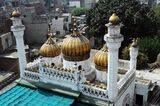
|
Lahore, Punjab | 5٬000 | 25,948 m2 (279,300 sq ft) | 1753 | Sunehri Mosque is located in the Kashmiri Bazaar of the Walled City of Lahore. The mosque was built in 1753 when the Mughal Empire was in decline. | [35][36] |
| Abbasi Mosque | 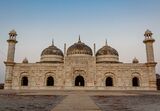
|
Bahawalpur, Punjab | 1٬000 | 1849 | Built by Nawab Bahawal Khan located at Derawar Fort. | [37][38][39] | |
| Al-Sadiq Mosque, Bahawalpur | 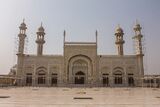
|
Bahawalpur, Punjab | 6,000 | 19th century | |||
| Bhong Mosque | 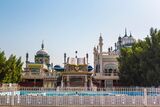
|
Rahim Yar Khan District, Punjab | 1982 | Bhong Mosque was designed and constructed over a period of nearly 50 years (1932–1982) and won the Aga Khan Award for Architecture in 1986. | [40][41][42] | ||
| CMH Masjid Jhelum | 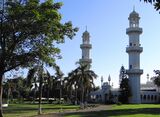
|
Jhelum Cantt, Punjab | 25,000 | 1950 | Located at Jhelum Cantt, the foundation of CMH Mosque was laid by General Muhammad Ayub Khan on March 21, 1950 and opening ceremony was headed by Governor of Punjab Sardar Abdur Rab Nishtar. | [43] | |
| Data Darbar | 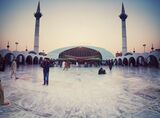
|
Lahore, Punjab | 52,000 | 34,200 m2 (368,000 sq ft) | 1978 | Data Darbar, located in the city of Lahore, is the largest Sufi shrine in South Asia. It was built to house the remains of the Muslim mystic, Abul Hassan Ali Hujwiri, commonly known as Data Ganj Baksh. | [44][45][46] |
| Faisal Mosque | 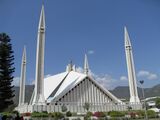
|
Islamabad | 300,000 | 54,000 m2 (580,000 sq ft) | 1986 | Faisal Mosque is the national mosque of Pakistan and is named after Saudi King Faisal. Its prayer halls can hold 100,000 worshippers, while the surrounding porticoes and the courtyard up to 200,000 more. | [47][48] |
| Faizan-e-Madinah | 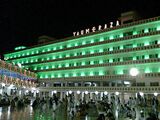
|
Karachi, Sindh | 20,000 | 10,000 m2 (110,000 sq ft) | 1999 | A Mosque and education center run by Dawat-e-Islami. One of the largest mosques in Pakistan covering over 10,000 m2 with a capacity of over 20,000. | |
| Grand Jamia Mosque, Karachi | 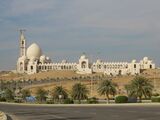
|
Karachi, Sindh | 800,000 | 202,343 m2 (2,178,000 sq ft) | 2021 | Grand Jamia Mosque, also known as Bahria Town Jamia Masjid Complex, is a cultural complex. | [49][50][51] |
| Grand Mosque Allahabad | 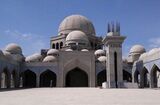
|
Naushahro Feroze District, Sindh | 10,000 | 7,400 m2 (80,000 sq ft) | Under construction | Grand Mosque Allahabad is located in Kandiaro, Sindh. | [52] |
| Grand Jamia Mosque, Lahore | 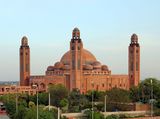
|
Lahore, Punjab | 100,000 | 2014 | Seventh largest mosque in the world, and the largest in Pakistan in terms of surface area. It can accommodate 25,000 worshipers indoors, while the courtyard and corridor leading to the main halls of worship can accommodate a total of 70,000. | [53][54][55] | |
| Jamia Al-Kauthar | Islamabad | 2٬500 | 1990 | Jamia Al-Kauthar Mosque is adjacent to the Shia seminary Al-Kauthar University. The iconic dome of this mosque is about 30 meters high from the ground level, and its 15 meters diameter makes the dome one of the largest in the country. | [56][57] | ||
| Lal Masjid (Red Mosque) |

|
Islamabad | 1965 | The Lal Masjid, also known as the Red Mosque, was built in 1965 and is named for its red walls and interiors. The mosque is one of the oldest mosques in Islamabad. | [58][59] | ||
| Qasim Ali Khan Mosque | 
|
Peshawar, Khyber Pakhtunkhwa | Qasim Ali Khan Mosque was built in 1842. There is a myth that the mosque was constructed during the Mughal era. | [60] | |||
| Shahi Mosque, Chitral | 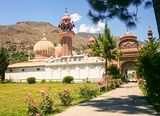
|
Chitral, Khyber Pakhtunkhwa | 20٬000 | 1924 | It was the principal mosque of Chitral at the time of the existence of the State of Chitral. The mosque was built by Shuja ul-Mulk in 1924. | [61][62][63][64] | |
| Tooba Mosque | 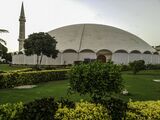
|
Karachi, Sindh | 5٬000 | 3,280 m2 (35,300 sq ft) | 1969 | Masjid-e-Tooba was built in 1969 in Defence Housing Society, Karachi. It is often claimed to be the largest single-dome mosque in the world. | [65][66] |
انظر أيضاً
المصادر
- ^ "15 Most Amazing and Beautiful Mosques in Pakistan". 5 October 2016. Retrieved 1 August 2018.
- ^ Kit W. Wesler (19 April 2012). An Archaeology of Religion. University Press of America. p. 253. ISBN 978-0761858454. Retrieved 8 September 2012.
- ^ "Friday Mosque of Banbhore". ArchNet. Retrieved 8 September 2012.
... the Jami' Masjid of Banbhore is one of the earliest known mosques in the Indo-Pakistan subcontinent.
- ^ "Banbhore Museum". Culture Department. Govt. of Sindh. Archived from the original on 8 November 2012. Retrieved 3 September 2012.
- ^ "Two of the oldest mosques of Pakistan". Blogs.dunyanews.tv. Retrieved 26 June 2018.
- ^ "Chaqchan Mosque, Khaplu". www.pakistantourism.com. Retrieved 26 June 2018.
- ^ Afridi, Banat Gul (1988). baltistan in history.
- ^ Amburq Mosque
- ^ Shahzad Bashir (2003). Messianic Hopes and Mystical Visions: The Nåurbakhshåiya Between Medieval. ISBN 9781570034954.
- ^ Dar, Nadeem (5 July 2015). "An architectural wonder, 25 feet under". The News (Pakistan). Retrieved 21 December 2016.
- ^ Qureishi, Tania (16 January 2016). "Neevin Masjid – the 8th wonder". Pakistan Today. Retrieved 21 December 2016.
- ^ "Begum Shahi Masjid". Retrieved 1 August 2018.
- ^ أ ب Asher, Catherine (1992). Architecture of Mughal India, Part 1, Volume 4. Cambridge University Press. ISBN 9780521267281. Retrieved 16 July 2017.
- ^ "Begum Shahi Masjid". Pakistan Today. 12 March 2016. Retrieved 31 August 2016.
- ^ Gibb, H. A. R. (1954). The Encyclopaedia of Islam. Brill Archive. ISBN 9004064710. Retrieved 30 August 2016.
- ^ "Dai Anga Mosque". Lahore Sites of Interest.
- ^ "DAI ANGA MOSQUE - 1635". Retrieved 1 August 2018.
- ^ Dar, Nadeem (20 June 2015). "A pearl inside Lahore Fort – Moti Masjid". Pakistan Today. Retrieved 6 January 2017.
- ^ Lahore Fort Complex: Moti Masjid Archived 25 مايو 2011 at the Wayback Machine at ArchNet. Retrieved 16 April 2008.
- ^ "Conservation of the Wazir Khan Mosque Lahore: Preliminary Report on Condition and Risk Assessment" (PDF). Aga Khan Development Network. 2012. Archived from the original (PDF) on 27 August 2016. Retrieved 25 August 2016.
- ^ "Wazir Khan's Mosque, Lahore". UNESCO. Retrieved 4 May 2015.
- ^ "OONCHI MASJID OF BHATTI GATE — ANOTHER WONDER LOST WITH THE PASSAGE OF TIME". Retrieved 1 August 2018.
- ^ Sluglett, Peter (2015). Atlas of Islamic History. Routledge. ISBN 9781317588979.
- ^ "SHAH JAHAN MOSQUE". Retrieved 1 August 2018.
- ^ "Shah Jahan Mosque, Thatta". Retrieved 1 August 2018.
- ^ "Mahabat Khan Mosque". Pharos:Research Journal of the Shaykh Zayed Islamic Centre. University of Peshawar. 3 (11). 1996. Retrieved 15 September 2017.
- ^ "AROUND TOWN: Masjid Mahabat Khan: Splendour of Mughal art". Dawn. 5 December 2008. Retrieved 15 September 2017.
- ^ "What is the capacity of the prayers that can be accommodated by the mosque?". Retrieved 1 August 2018.
- ^ "Badshahi Mosque, Lahore". www.pakistantoursguide.com. Retrieved 26 June 2018.
- ^ Meri, Joseph (31 October 2005). Medieval Islamic Civilization: An Encyclopedia. Routledge. p. 91.
- ^ "Badshahi Masjid". Archnet. Retrieved 24 August 2016.
- ^ "Badshahi Mosque". Ualberta.ca. Retrieved 2 January 2014.
- ^ "Jamia Mosque (Khudabad) in Dadu District". www.sindhidunya.com. Retrieved 13 October 2018.
- ^ Yousaf, Mohammad (1971). A Brief History of Multan. Ferozsons.
- ^ "Sonehri Mosque". Lahore Sites. Retrieved 28 August 2016.
- ^ "Sonehri Mosque". Retrieved 1 August 2018.
- ^ "Abbasi Mosque at Derawar Fort". Beautifulmosque.com. Retrieved 26 June 2018.
- ^ "Built by Nawab Bahawal Khan in 1849". www.dawn.com. Retrieved 24 June 2018.
- ^ Desk, Interactive (10 January 2016). "9 historical Pakistani mosques that will transport you to another time".
- ^ "Bhong Mosque". Retrieved 1 August 2018.
- ^ "Architecture Pakistan: Bhong Mosque". Archived from the original on 2017-07-11. Retrieved 2013-02-25.
- ^ Pakistan Post
- ^ "JHELUM- THE CITY OF SOLDIERS". Retrieved 1 August 2018.
- ^ Halafoff, Anna; Clarke, Matthew (2016). Religion and Development in the Asia-Pacific: Sacred Places as Development Spaces. Taylor & Francis. ISBN 9781317647454. Retrieved 12 September 2017.
- ^ Quraeshi, Samina (2010). Sacred Spaces: A Journey with the Sufis of the Indus. Peabody Museum Press. ISBN 9780873658591. Retrieved 12 September 2017.
- ^ "Data Darbar Complex". Retrieved 1 August 2018.
- ^ "Faisal Mosque - Islamabad, Pakistan". www.sacred-destinations.com. Retrieved 2016-11-17.
- ^ "KING OF ALL MOSQUES – FAISAL MOSQUE". Retrieved 1 August 2018.
- ^ "Groundbreaking ceremony". The Nation. 7 January 2015. Retrieved 17 December 2015.
- ^ "Bahria breaks ground on world's 3rd largest mosque". The Express Tribune. 7 January 2015. Retrieved 17 December 2015.
- ^ "Karachi: Foundation stone of world's 3rd largest mosque laid - Pakistan - Dunya News". dunyanews.tv. Retrieved 17 December 2015.
- ^ "Grand Mosque, Allahabad". www.islahulmuslimeen.org. Retrieved 10 October 2018.
- ^ "Pakistan's third largest mosque". timesofindia-economictimes. Retrieved 17 December 2015.
- ^ "Unparalleled achievement: Zardari inaugurates Pakistan's largest mosque". The Express Tribune. 15 October 2014. Retrieved 17 December 2015.
- ^ "Beautiful Mosque Pictures". www.beautifulmosque.com. Retrieved 2016-10-25.
- ^ "Jamia Al-Kauthar Mosque".
- ^ "Jamia Al-Kauthar Mosque".
- ^ "Profile: Islamabad's Red Mosque". BBC. July 3, 2007. Retrieved January 5, 2010.
- ^ "The legacy of Lal Masjid". Retrieved 1 August 2018.
- ^ Shinwari, Sher Alam (2015-06-24). "Facts and fiction surrounding the historic Masjid Qasim Ali Khan". Dawn. Retrieved 2018-12-17.
- ^ "Shahi Mosque, Chitral". www.croozi.com. Retrieved 5 July 2018.
- ^ "Information on alamy.com". www.alamy.com. Retrieved 5 July 2018.
- ^ "Built in 1924 by Shuja ul Mulk". www.alamy.com. Retrieved 28 May 2018.
- ^ "Mehtar of Chitral from 1895 to 1936". www.dilkashpakistan.com. Retrieved 18 June 2018.
- ^ "Masjid-e-Tooba – All You Need To Know!". Retrieved 1 August 2018.
- ^ "MASJID-E-TOOBA". Retrieved 1 August 2018.